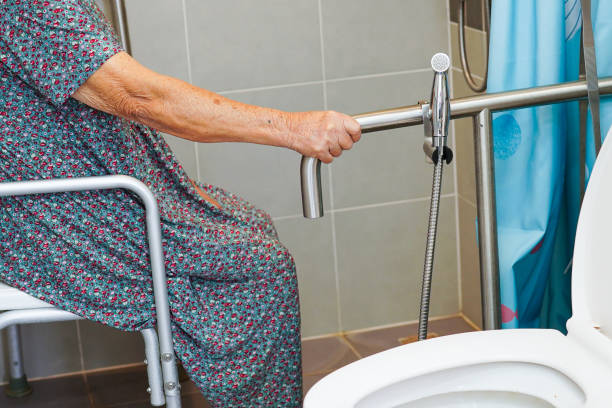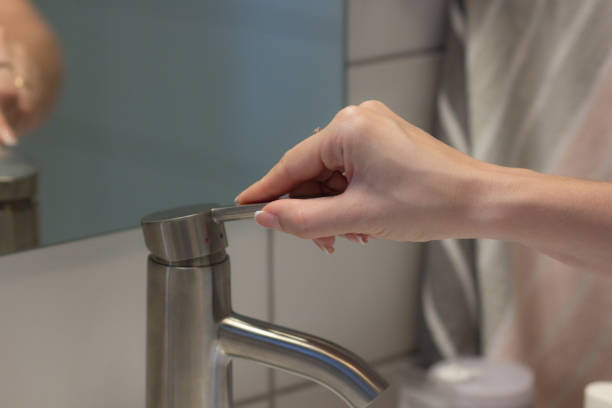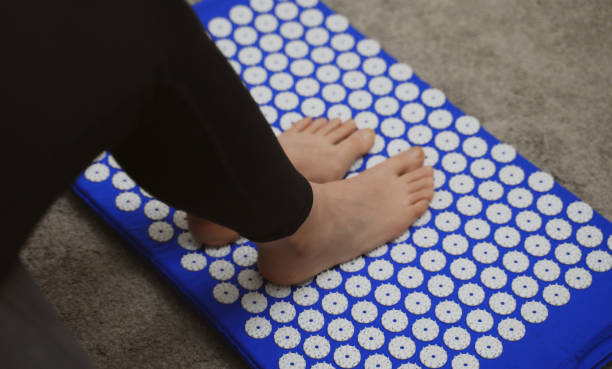Introduction

Living with Parkinson's disease presents unique challenges, especially when performing daily tasks like bathing and showering. The motor symptoms associated with Parkinson's, such as tremors, stiffness, and impaired coordination, can make these seemingly simple activities difficult and unsafe. However, thanks to advancements in assistive technology, individuals with Parkinson's now have access to a range of specialized devices designed to enhance their bathing and showering experience.
This blog post will discuss assistive devices designed for people with Parkinson's disease to help them in the bathroom and maintain their independence, safety, and dignity. Whether you are a person with Parkinson's or a caregiver seeking solutions, read on to discover the valuable assistance these devices can provide.
What are assistive devices for bathing and showering?
Assistive devices for bathing and showering are tools designed to help people with Parkinson's Disease perform their daily hygiene routines safely and comfortably. These aids can minimize or eliminate physical disabilities that arise from the condition, such as tremors, balance issues, and stiff muscles.
Why are assistive devices important for individuals with Parkinson's disease?

Assistive devices can help individuals with Parkinson's disease to maintain their independence while safely and comfortably performing daily activities. Assistive devices for bathing and showering provide a range of practical solutions to make bathing easier, safer, and more comfortable for individuals with PD. These tools can be used to maintain personal hygiene, reduce the risk of injury, and improve the overall quality of life.
One assistive device used for bathing is a shower chair or bench. Shower chairs provide support when sitting in the shower, reducing fatigue and allowing individuals to bathe without standing for long periods. Handheld showers can also be helpful, providing better control over water temperature and allowing individuals with limited mobility to bathe without standing.
Grab bars can also be extremely helpful when bathing, giving users something to grab onto for support while entering and exiting the shower. Non-slip mats can also provide extra traction to help prevent falls in wet areas like showers or bathtubs.
Finally, shower aids such as long-handled sponges and body washers can help individuals with limited mobility to reach their entire body while bathing. The tools are meant to help users access objects without having to stretch or bend too much.
Assistive devices for bathing and showering can provide various benefits for individuals with Parkinson's disease. These tools are designed to minimize the chances of falling, preserve self-sufficiency, and ensure a secure and pleasant bathing experience.
Assistive Devices for Bathing and Showering with Parkinson's Disease
Parkinson's disease often affects mobility, making routine activities such as bathing and showering more difficult. Fortunately, there are assistive devices that can help improve safety and facilitate the process of bathing or showering.
Here are some assistive devices that can help with bathing and showering while living with Parkinson's:
1. Grab bars:
Grab bars provide support and stability for individuals with Parkinson's disease. They can be installed in bathrooms, showers, and bathtubs to help reduce the risk of falling or injury due to reduced balance and mobility. Grab bars can also be used to transfer from one position to another while bathing. The best grab bar for an individual will vary based on factors like the bathroom fixture type and the person's level of mobility.
2. Raised toilet seats:
Raised toilet seats are a great way to help individuals with Parkinson's disease who have problems getting up or sitting down from a regular toilet seat. Installing a raised toilet seat can provide additional support and reduce the risk of falling. Various sizes and styles are available to match any bathroom fixture.
3. Shower chairs:
If standing up while showering is not an option, then using a shower chair could be beneficial. Shower chairs provide added stability and support while showering and reduce the risk of falling. There are different styles available, some of which have armrests or backrests for extra comfort and support.
4. Walk-in tubs:
For individuals with Parkinson's disease who are unable to safely access a regular bathtub, walk-in tubs make for a great alternative. They are designed with an inward-swinging door that allows for easy access and exit, as well as seats and handrails for added safety and stability.
5. Handheld showerheads:
Handheld showerheads are a great way to make showering easier for those with Parkinson's disease. Using them can give you more control and flexibility in directing the flow of water, making bathing less tiring and more energy efficient. Also, many handheld showerheads include adjustable height and ergonomic designs for added comfort.
6. Bath lifts:
Bath lifts are a great option for individuals with Parkinson's disease who have difficulty getting in and out of the bathtub. Our product facilitates a secure and cozy transitioning process from sitting to standing inside the bathtub. It helps lower the chances of falls or harm caused by limited mobility.
Bath lifts can be manual or powered, depending on the individual's needs. Manual lifts require someone to operate them, while powered bath lifts are operated with remote control. In addition, some bath lifts also feature adjustable heights and reclining backrests for added comfort and support.
7. Slip-resistant mats:

Slip-resistant mats are an essential safety item for individuals with Parkinson's disease. They provide extra traction in the bath or shower, helping to reduce the risk of slips and falls. Several types of slip-resistant mats are available, such as those made from rubber or vinyl that have suction cups on the underside to hold them in place. Also, many shower stalls have built-in mats for added safety and convenience.
Apart from the devices mentioned earlier, individuals with Parkinson's disease can also use a range of hygiene aids to assist them with bathing or showering. These include items such as bath sponges, suction cups, and grab bars. Additionally, specialty soaps, shampoos, and lotions have been developed specifically for people living with Parkinson's.
Overview of common motor symptoms affecting bathing and showering
Some common motor symptoms are associated with Parkinson's Disease and can affect a person's ability to bathe or shower. These include tremors, stiffness, rigidity, balance issues, slowed movements, and impaired coordination and flexibility. Some individuals who have Parkinson's Disease may face challenges when it comes to performing essential daily tasks such as bathing and showering. It can be especially difficult to stand in the shower or bathtub, wash oneself, navigate slippery surfaces, use a regular bathtub or shower area, etc.
Benefits of using shower chairs for stability and balance
Bathing and showering with Parkinson's Disease can be challenging. A shower chair provides stability, balance, and independence in the bathroom.
A shower chair provides various benefits, and some of them are listed below:
-
Safety and Security - Shower chairs provide support while bathing or showering, reducing the risk of slips or falls. They also provide a secure, stable seating surface that can help transfer in and out of the bath or shower safely and easily.
-
Comfort and Convenience - Shower chairs are adjustable, making them comfortable for users with different needs. The ergonomic design helps support the body while bathing or showering, providing comfort and convenience.
-
Independence - For those with balance or mobility issues, a shower chair can help maintain independence by reducing the risk of injury from falls. This can help keep users safe and independent in their bathing routine.
-
Ease of Use - People with Parkinson's Disease can benefit from using shower chairs because they are designed with simplicity and ease of use in mind. The adjustable height and seat angle make it easy to get into a comfortable position, while the non-slip feet provide additional stability and safety.
-
Cost Savings - Shower chairs are durable and long-lasting, making them an economical choice for those needing assistive devices for bathing or showering.
-
Versatility - Shower chairs are designed for use in various settings, including the bathtub, shower stall, or even outside on the patio or deck. These are ideal for individuals who require additional support and stability during bathing.
FAQ's
What is the best assistive device for Parkinson's disease?
The best assistive device for Parkinson's disease depends on the individual's needs. Various options include shower chairs, slip-resistant mats, hygiene aids, specialty soaps, shampoos, grab bars, and suction cups.
What mobility tools do Parkinson's patients use?
Parkinson's patients may use various mobility tools to help them with daily activities, including shower chairs and grab bars for stability while bathing or showering. They may also use specially formulated soaps, shampoos, and lotions designed specifically for those with Parkinson's Disease. Hygiene aids such as suction cups and slip-resistant mats can also be helpful. Finally, various adaptive equipment may help with dressing and other ADLs.
What special-use utensil was invented to help people with Parkinson's?
The Rocksteady Utensil is a specially designed utensil for people with Parkinson's who have difficulty eating. Its ergonomic design can provide users with a better grip and stability while eating. There are also interchangeable tips for different types of food. This product aims to assist people with Parkinson's in preserving their autonomy and enhancing their overall health.
What is the life expectancy of a person with Parkinson's disease?
The life expectancy of a person with Parkinson's disease varies from individual to individual. However, the average lifespan for someone with PD is about 14 years after diagnosis. Please note that this number may differ based on other factors like age of diagnosis and general health status. Generally, those who receive early treatment and manage their symptoms have a better prognosis. It is important to remember that Parkinson's disease affects each person differently, and life expectancy can vary widely between individuals.
Can Parkinson's be cured?
Parkinson's disease does not have a cure at the moment. Though researchers are making efforts to discover new treatments and therapies to slow down or halt the progression of PD, a cure is yet to be found. However, advancements in research in recent years have enhanced the quality of life and increased the lifespan of those with the condition.
How is Parkinson's diagnosed?
Parkinson's is diagnosed through a physical exam, medical history review, and neurological tests. The doctor might ask for imaging tests such as MRI or CT scans to rule out other potential causes for the movement-related symptoms. They may also check for certain blood or spinal fluid markers that can indicate PD. Once all tests have been conducted and a diagnosis is confirmed, the doctor can create a treatment plan that helps manage symptoms and improve quality of life.
Conclusion
I hope the article on assistive devices for people with Parkinson's disease has been useful. From shower chairs and grab bars to specialized soaps, shampoos, and lotions, a variety of tools and products can help make bathing or showering easier and more comfortable. Additionally, adaptive equipment like the Rocksteady Utensil can help with mealtime. While there is no known cure for PD, collaborating with your doctor to create a customized treatment plan can aid in delaying the advancement of the disease and improving your overall well-being. There are various therapies and treatments accessible that can enhance your condition.

